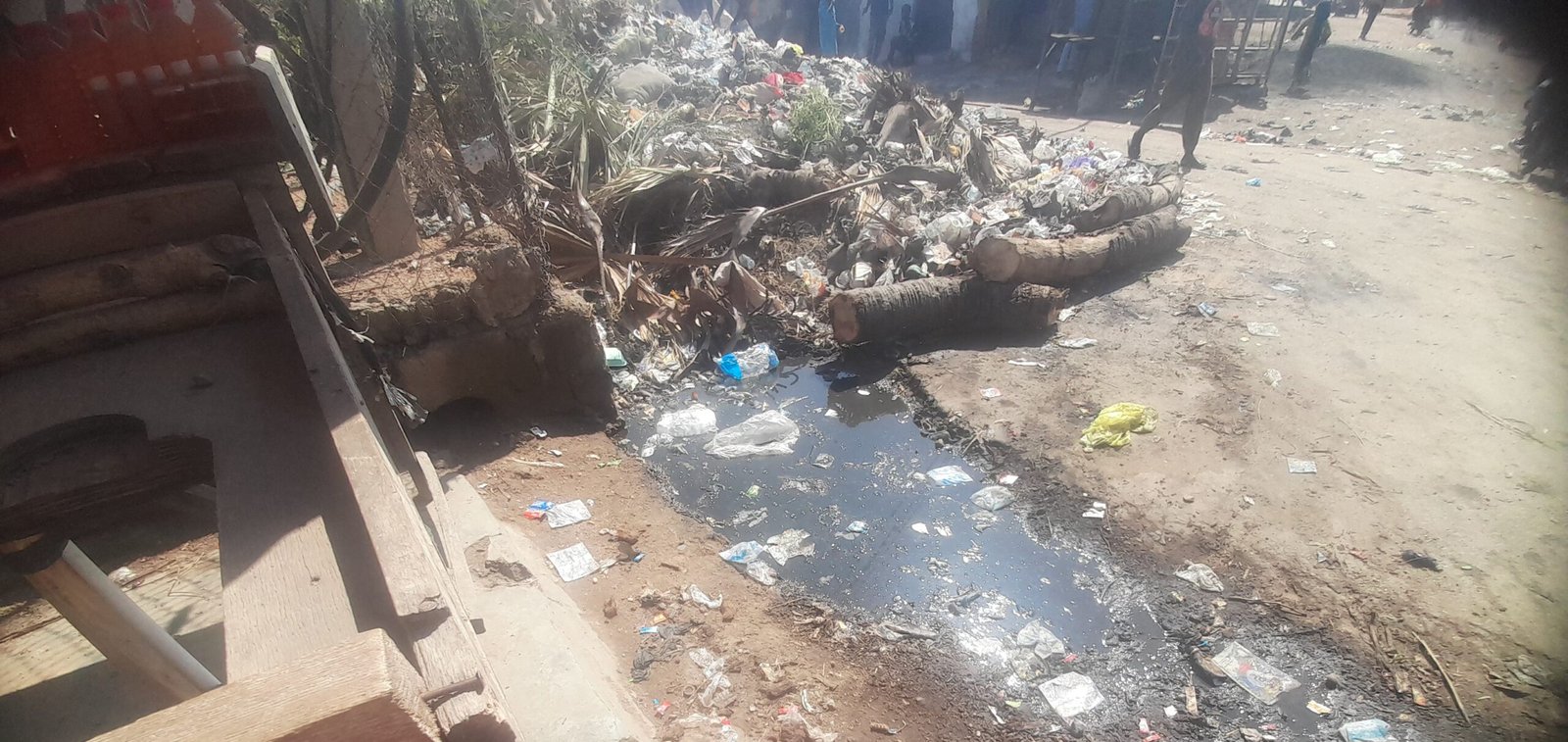For residents of Kwana Shida, living beside a mountain of garbage has become normal. The open dump site is adjacent to a major road that connects Maiduguri and Zaria highways, where schoolchildren, food vendors, and traders go about their daily activities.
“We sleep and wake up with flies. The smell enters our food, our shops, and homes. We have complained to the authorities, but the dump keeps growing,” lamented a food vendor, Amina Idris, whose shop stands just meters from the waste pile. I sell rice and beans here, but sometimes I feel ashamed calling out customers, because they cover their noses while buying.
Another resident, Mohammed Tijjani, who operates a motorcycle mechanic workshop nearby, said the refuse has worsened the drainage problem in the area.
This road floods within minutes because the gutter is blocked with waste. The smell becomes unbearable, and people slip or get stuck in the dirty water.
A woman who fries snacks along the same road, Sa’adatu Umar, expressed concern over the health hazards. “We hear of cholera outbreaks in other places. I don’t think it will take long before we face a similar problem”, she said. Hussaini Kafi, Africa Health Report, AHR, correspondent who visited the dump files in this features.

Residents also noted that the proximity of the waste to food vendors puts many at risk. Children walk barefoot around the site, inhaling smoke from burning waste or stepping into stagnant water mixed with garbage.
Sanitation drive not reaching all neighborhoods
Despite the Kano State Government’s high-profile launch of Operation Nazafa, residents say areas like Kwana Shida have seen little impact.
The state recently introduced modern trucks and motorcycles to boost waste clearance and deployed staff from the Refuse Management and Sanitation Board (REMASAB) and the Ministry of Environment. Yet, these efforts appear concentrated around high-traffic areas like Sabon Gari, Hotoro, and State Road.

“They say sanitation trucks are working, but when they come they don’t evacuate the refuse complete that’s why it growth in a little time. The waste keeps increasing. Even during the monthly sanitation exercise, nobody comes to inspect or help us clean, said a trader in Kwana Shida, Musa Lawal.
AHR’s visit to the area during today’s sanitation exercises (Monthly exercise take place at the weekend of end of month) confirmed that no official cleaning teams reached the dump. Instead, residents burned parts of the waste in the early morning, releasing plumes of smoke into the air. However, our Correspondent learnt that the exercise was cancelled due to a convocation ceremony at a state varsity (Northwest University).
Chairman defends government efforts
When contacted, the Managing Director of REMASAB, Muhammad S. Khalil, said that the state government is aware of the challenges and is working to address them.
“The government has revamped the monthly environmental sanitation and Operation Nazafa as a holistic response to the challenges of urban waste. Thirty motorcycles and sweeping trucks have already been deployed across the city, and more are on the way. But we also need residents to cooperate by disposing of their waste properly and observing the designated sanitation hours,” Khalil said.
He added that the waste problem in Unguwa-Uku and surrounding areas is worsened by illegal dumping and lack of public compliance with sanitation regulations.
We recently arrested dozens of violators and are expanding the environmental marshal unit to enforce compliance. You will begin to see results very soon.
Experts say system needs better coordination and local engagement
Public health experts argue that while Operation Nazafa is a step in the right direction, it must go beyond symbolism and Public Relations.

An environmental health specialist at the Bayero University, Dr. Ahmad Salihu, said that lack of grassroots planning and enforcement is the reason waste continues to pile up despite the launch of high-level campaigns.
Said Salihu, “Kano’s sanitation system remains top-down and reactive. There’s not enough community involvement. Areas like Kwana Shida are neglected because officials focus on ceremonial routes and ignore the suburbs”.
He warned that open dumps near residential areas pose serious risks, including malaria, typhoid, cholera, respiratory infections, and contamination of water sources.
He added, “Even if you burn the waste, the smoke carries pathogens and toxins. Children are the most vulnerable, especially in rainy season when bacteria thrive”.
Dr. Salihu called on the state government to empower local leaders, civil society, and sanitation taskforces at ward level to monitor and maintain hygiene standards.
Environmental laws, but limited enforcement
Though Kano State has laws guiding environmental protection, including the Sanitation and Pollution Control Edict of 1996, implementation remains weak.
The law mandates residents to clean their premises every week and penalizes indiscriminate dumping. Yet, few violators are ever prosecuted. Instead, heaps of garbage continue to emerge in places like Kwana Shida, Gidan Murtala, Dawanau, and Dakata.
In 2024, the Ministry of Environment recorded 4,215 waste-related complaints in urban Kano. Over 2,000 of those were traced to blocked drains and illegal dumpsites. But only 150 people were fined, according to government records.
Residents say during rainy season, children often develop skin infections, diarrhea, and fever. The nearest primary healthcare center is over 30 minutes away, and many families resort to patent medicine vendors or herbal remedies.
We don’t want this to become another cholera zone
In 2021, Kano recorded over 1,000 cases of cholera in areas like Garko, Bichi, and Fagge, according to the Nigeria Centre for Disease Control (NCDC). Public health advocates fear that if dumpsites like the one in Kwana Shida are not urgently cleared, another outbreak is imminent.
“The risk is real. It only takes one rainfall for the waste to contaminate water channels. If preventive action isn’t taken, we will see avoidable deaths, said a community health volunteer, Ibrahim Ma’aruf.
He urged the government to integrate WASH (Water, Sanitation and Hygiene) education into school programs and work with local religious leaders to promote hygiene.
A call for sustainable action
As Operation Nazafa continues, environmental experts and community leaders are calling for a more sustainable and decentralized waste management plan.
We need to decentralize waste collection to LGAs and ensure community-based waste pickers are supported with equipment. Only then can we say we are serious about hygiene and disease prevention, said Dr. Salihu.
Meanwhile, residents of Kwana Shida continue to endure life beside a mountain of filth—fearing the next rainfall, outbreak, or government neglect.



